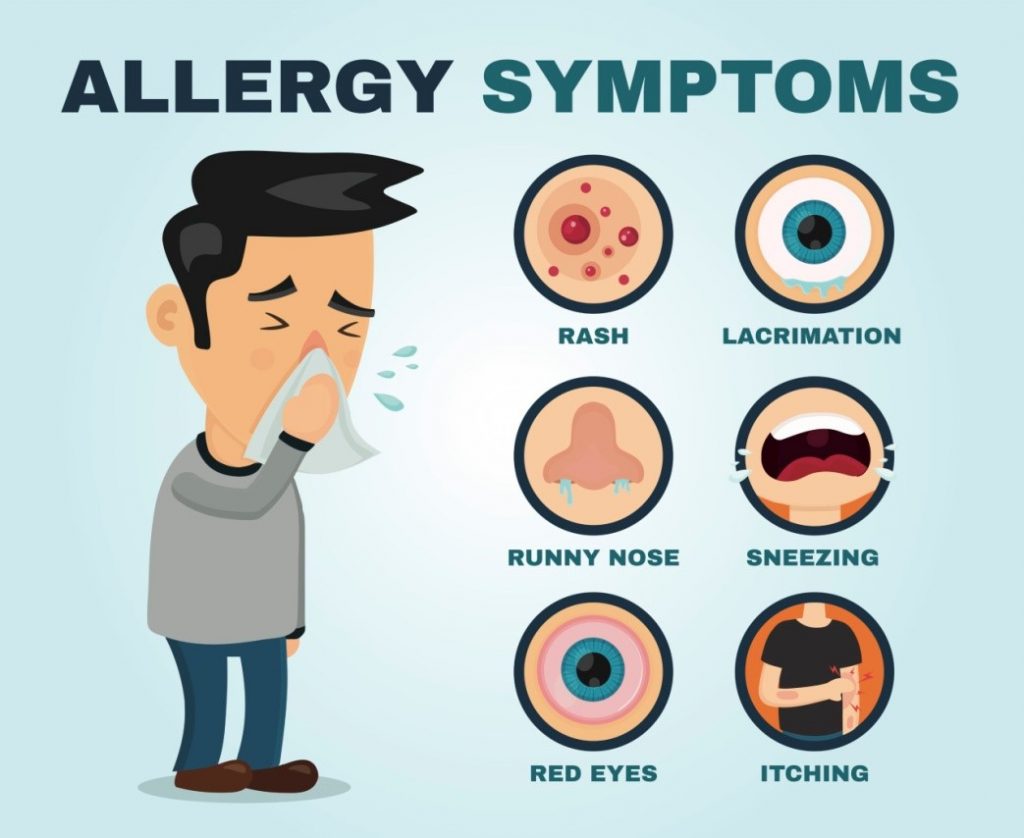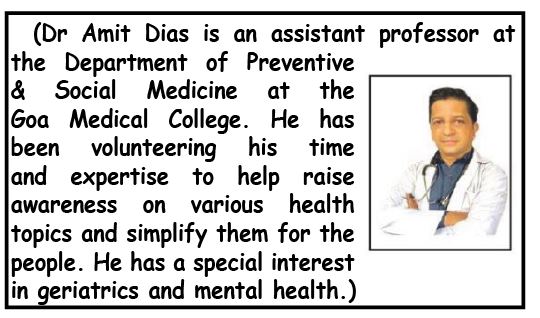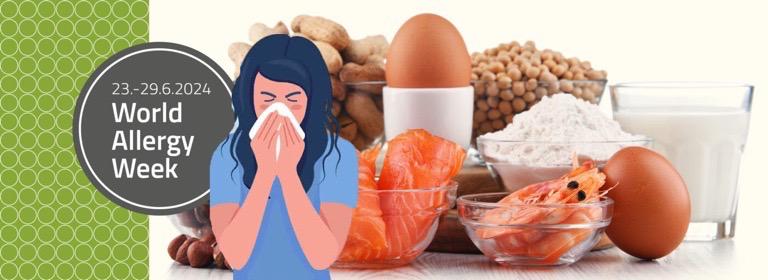An International Allergy Awareness Week special
The last week of June is observed as International “Allergy Awareness Week.” Dr Amit Dias gets behind the sneezes and rashes to understand how we can fight allergies, “Do not let your allergy stop you from enjoying life…there are ways by which we can protect yourself from allergies,” he says.
An interview with Dr Amit Dias
Goan Observer: First, could you explain to our readers what exactly we mean by an allergy?
Dr Amit Dias: An allergy is an overreaction of the body’s immune system to a normally harmless substance, such as pollen, certain foods, or medications. When someone with an allergy comes into contact with an allergen, their immune system treats it as a threat. It releases chemicals like histamine, leading to various symptoms ranging from mild discomfort to severe reactions.
Q: Is it the same as hypersensitivity? Could you clarify the difference between allergy and hypersensitivity?
A: Allergy is a specific type of hypersensitivity reaction where the immune system reacts abnormally to a harmless substance, such as pollen, dust or certain foods. Hypersensitivity, on the other hand, is a broader term encompassing all types of exaggerated immune responses, including allergies.
Q: Is it worthwhile going for an allergy test?
A: Allergy testing helps identify the specific allergens triggering a person’s symptoms. This knowledge is crucial for effective management and avoidance strategies. It can also guide treatments like medications or allergen immunotherapy. If a person finds themselves allergic to one item, then they are likely to be allergic to many others and it’s worthwhile knowing what you are allergic to so you can be prepared and avoid them.
Q: What are the symptoms of allergy?
A: The common symptoms are rash, lacrimation (watering of the eyes), runny nose, sneezing, red eyes, itching, choking sensation, breathlessness, cramps, diarrhea, weak pulse, drop in blood pressure, and fainting. Do consult a doctor immediately and take first aid measures.

Q: What exactly causes symptoms like sneezing, itchy eyes and other allergic reactions?
A: These symptoms occur when the immune system mistakes a harmless substance (allergen) for a threat. It releases chemicals like histamine, which leads to inflammation and irritation in the affected tissues (such as nasal passages or eyes), resulting in symptoms like sneezing, itching and swelling.
Q: What are the common allergies that people have?
A: The common allergies are:
- Respiratory allergies: Such as allergic rhinitis (hay fever) and asthma.
- Food allergies: Particularly to nuts, eggs, shellfish, seafood, and dairy products.
- Skin allergies: Such as eczema and hives.
- Medication allergies: Reactions to certain medications–sulfa-containing drugs are notorious but there are many others that one may be allergic to. Sometimes we have patients who are allergic to almost all antibiotics.
- Insect sting allergies: Reactions to bee stings or bites, cockroach allergy, etc.
We often come across food allergies such as food allergies, or seafood allergies to prawns and shellfish. These allergens contain proteins that can result in an immediate life-threatening allergic reaction. Upon eating, they can lead to a rapid onset of symptoms such as throat swelling, severe breathing difficulties, crashing blood pressure, hives and gastrointestinal distress. It is best to avoid these food items, but sometimes these items are added to our food and we do not know what we are consuming and this leads to problems.

Q: Can people die due to their allergies?
A: Yes they can, that’s why we are talking about it and stressing about it. Allergies can range from mild to life-threatening. Anaphylaxis is a severe allergic reaction that can be fatal if not treated promptly. Individuals at risk of anaphylaxis need to have an emergency action plan and carry an epinephrine auto-injector.
Anaphylaxis is a severe, potentially life-threatening allergic reaction that requires immediate medical attention. Symptoms of anaphylaxis may include difficulty breathing, swelling of the throat and tongue, rapid or weak pulse, severe drop in blood pressure (shock) and loss of consciousness.
Q: I notice these allergies getting more frequent… could you shed some light on the global and Indian situation?
A: Allergies are increasingly recognized as a significant global health issue. In India, as elsewhere, allergies affect a large portion of the population. According to recent studies, approximately 20-30% of Indians suffer from some form of allergy, with respiratory allergies being the most prevalent. Globally, the World Allergy Organization estimates that over 25% of the world’s population suffers from allergies and the numbers are rising.
Q: Why do you think cases of allergies are on the rise?
A: Several factors contribute to the rise in allergies. These include increased exposure to allergens due to urbanization, changes in dietary habits, exposure to fast foods, environmental factors such as pollution, and possibly even genetic predispositions. Lifestyle changes and urbanization seem to play significant roles, altering our immune system’s responses and increasing susceptibility to allergies.
Do not let these allergies restrict and restrain you, you can enjoy life despite these allergies. Learn how to protect yourself.
Q: Yes, how can we protect ourselves?
A: Let me summarize them and help you recollect. Remember the word P.R.O.T.E.C.T. and this is what it stands for:
P: Prevention is much better than cure — know what you are allergic to and avoid them.
R: Recognize symptoms and act immediately.
O: Observe dietary restrictions if you have food allergies. Be sure of what you are eating — it could contain nuts etc which are allergens and can be fatal.
T: Treat symptoms promptly.
E: Educate yourself and others about allergies.
C: Consult a doctor or an allergist for personalized advice.
T: Take medications as prescribed.
Q: If someone is diagnosed with an allergy, how can they manage it effectively?
A: Managing allergies involves:
- Avoidance: Stay away from known allergens as much as possible.
- Medications: Use antihistamines, nasal sprays, or other prescribed medications to alleviate symptoms.
- Immunotherapy: In some cases, allergen immunotherapy (allergy shots) can desensitize the immune system over time.
- Emergency plan: Individuals with severe allergies should carry an epinephrine auto-injector (EpiPen) and know how to use it in case of a severe allergic reaction.
Q: You mentioned about “allergen immunotherapy,” what exactly is it and how can it help?
A: Immunotherapy involves gradually exposing a person to increasing amounts of an allergen to desensitize their immune system. This can be done through allergy shots (subcutaneous immunotherapy) or under-the-tongue tablets (sublingual immunotherapy). Over time, immunotherapy can reduce the severity of allergic reactions and sometimes eliminate the need for ongoing medication.
Q: What message would you like to convey to our readers?
A: I urge everyone to educate themselves about allergies, recognize symptoms early, and seek medical advice promptly if they suspect an allergy. With proper management and awareness, we can improve the quality of life for millions affected by allergies worldwide and live a happy life. Protect yourselves and spread awareness.

